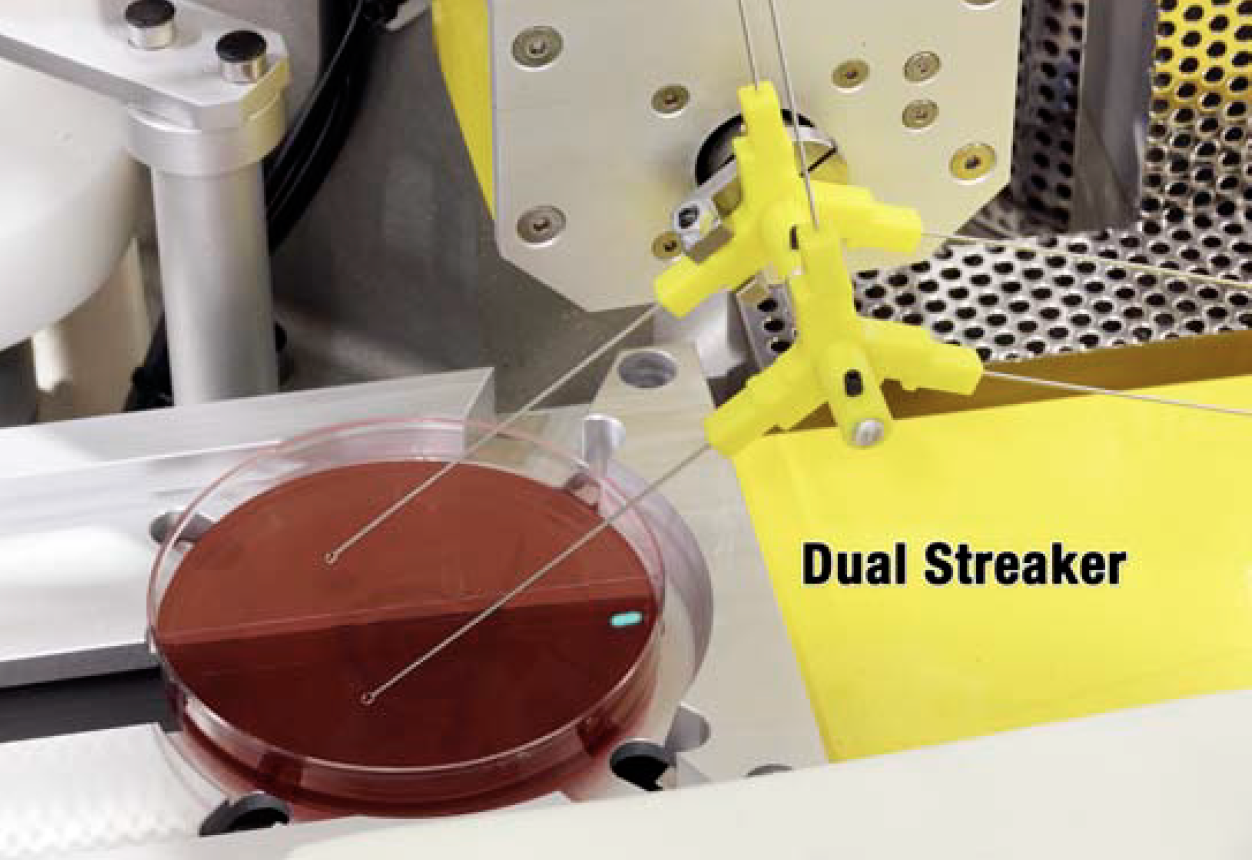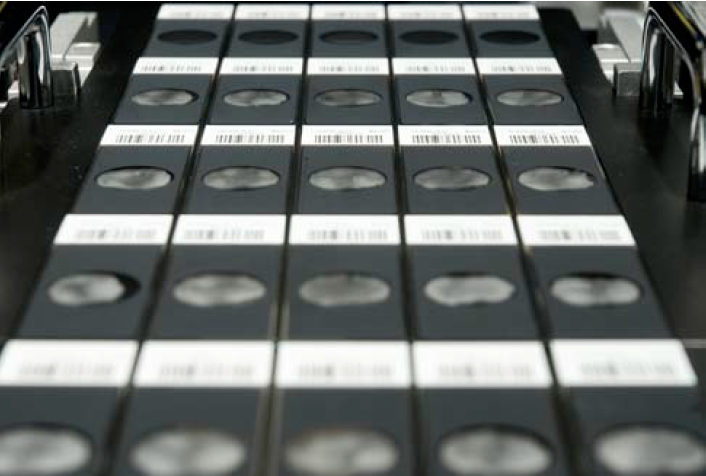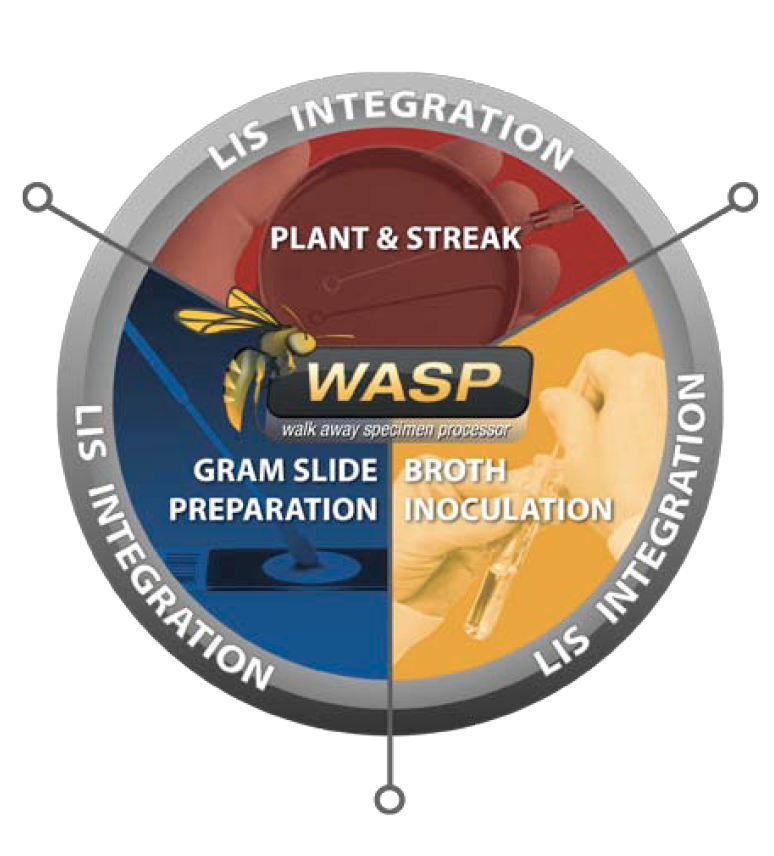Copan Redefines Automated Specimen Processing with Groundbreaking New Features
June 15, 2010

Copan unveiled new groundbreaking features of its Walk- Away Specimen Processor (WASP®) while attending the 110th General Meeting for the American Society for Microbiology (ASM) in San Diego, California this past May. Copan’s line of automation was introduced to the market in 2008 with the launch of the WASP®, a revolutionary system for automatic planting and streaking of all microbiology samples. While attending the 110th ASM meeting, Copan unveiled truly revolutionary new features of its automation line, such as automatic gram slide preparation, ability to place two different patient samples on one plate, inoculation and labeling of enrichments broths, and higher throughput capability with the Dual Streaker.
Depending on the type of specimen, specimen processing of bacteriology samples consists of three different steps: (a) planting and streaking of the sample; (b) gram slide preparation for doing gram stains; and (c) inoculation of enrichment broths for sub-culturing. All three steps are important routine tasks that need to be done properly to ensure a reliable and accurate diagnosis, but are also very manual and require a lot of the technologists’ time and effort. Until recently, in the field of automated specimen processing for bacteriology samples, processing had been defined and limited to planting and streaking. Automating planting and streaking was a much-needed solution in a time of increasing workloads and diminishing resources. However, planting and streaking instruments currently in the market solved only one step of specimen processing.
Reducing repetitive stress injuries was one of the main factors sparking interest in automation in the front end of Microbiology. “After launching the WASP®, Copan was constantly asked about the other two steps of specimen processing, gram slide preparation and inoculation of pre-enrichment broths, because, while specimen processors manage the laborious task of planting and streaking diverse sample types, technologists still had to return to the specimen to open, sample and close to perform the two tasks that complete the specimen processing cycle,” stated Norman Sharples, Copan Diagnostics’ Executive Vice President.

In response to customers’ request, Copan developed the WASP® in a modular way to accommodate future needs for automation. While attending ASM’s general meeting, Copan successfully launched the Gram SlidePrep™, which is a module designed to prepare a Gram slide after the sample has been inoculated onto culture plates by the WASP® and to permanently inkjet directly onto the glass slide the patient’s barcode and specimen descriptors.
The inkjet labeling withstands all solvents and reagents used during processing, eliminating the need for a paper label. Judy Reid, Regional Technical Specialist in Vancouver Coastal Health Authority’s Microbiology Laboratory, the first laboratory to adopt the WASP in Canada, commented that “the gram stain module looks very exciting since now the WASP can also prepare and label the gram smears. This will further reduce the manual workload and result in a more consistent gram stain and eliminate mislabeling of slides.”
When asked about his reaction to the new Gram SlidePrep™, Dr. Yoram Keness, Director of Clinical Microbiology Laboratory, at Ha-Emek Medical Center in Israel stated that “including a module for gram stain in the WASP’s flowchart robotics is not less important than the streaking, since the bacteriological truth of a specimen lies in the gram stain results.”

In addition to the Gram SlidePrep™ module, Copan’s new generation WASP® can also inoculate enrichment broths, like LIM and Selenite, and automatically place a barcode on tubed media, while processing plated media at the same time. These exciting new features were well received by customers in the worldwide market launch because they truly complete the specimen processing circle in the pre-analytical phase of microbiology and provide a comprehensive, modular, and customizable solution to the arduous process of specimen setup. Pauline Lo, a Microbiologist from
Mount Sinai Hospital in Canada, who attended the product launch expressed that she was “extremely impressed with the ‘open’ system of WASP®. In particular, how fast it could adapt to users’ needs, such as the universal de-capper, gram stain maker and the tubed media inoculator.” After seeing the new capabilities, she concluded that “Copan is willing and capable to continue to move forward and improve the WASP®. As funds are tight, we would like to invest in something that is useful today, as well as further into the future.”
About Copan Group
With a reputation for innovation in preanalytics, Copan is the leading manufacturer of collection and transport systems in the world. Copan offers a complete range of microbial sampling products used for traditional culture analysis and molecular diagnostic assays. For more information, visit www.copanusa.com

